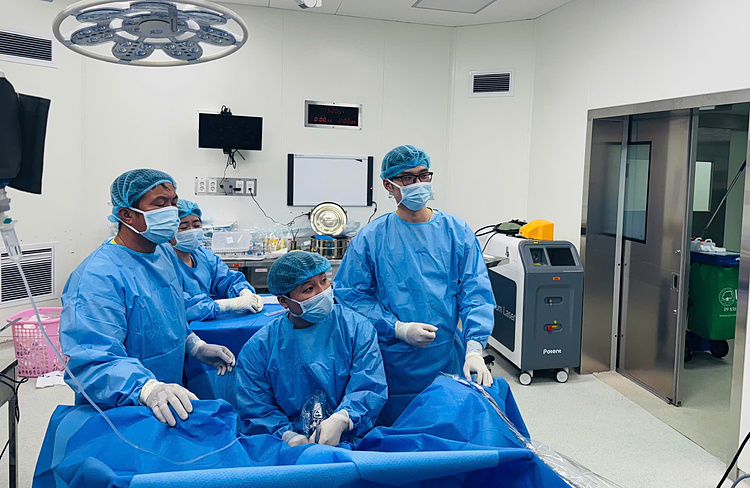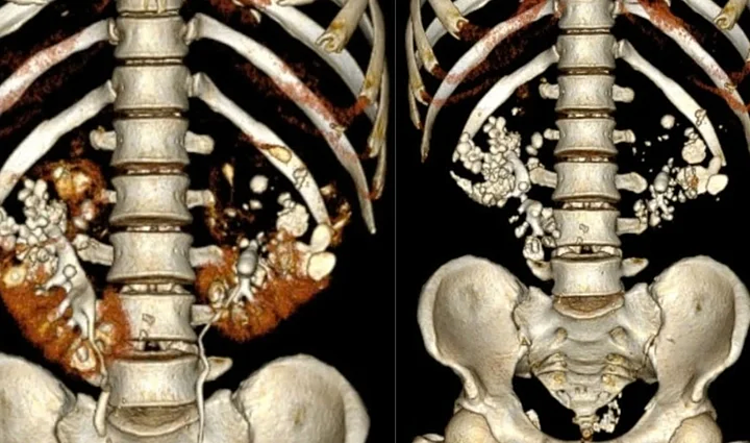The scan revealed both kidneys were almost completely blocked by hundreds of thousands of tiny stones. "The stones were packed like corn kernels", Dr. Luc recounted on 9/7/2025.
The man, an IT engineer from Phu Tho, regularly worked through the night, substituted soda for water, and was inactive. Two years prior, he experienced abdominal pain and painful urination, indicating kidney stones in both kidneys. However, he underestimated the severity and didn't complete his treatment, continuing his unhealthy lifestyle. Recently, experiencing prolonged fatigue, he was diagnosed with severe kidney failure due to excessive stone accumulation. Rejected for surgery at a local hospital, he sought treatment at E Hospital.
Dr. Luc determined the patient's irregular lifestyle led to his premature kidney failure. A sedentary lifestyle reduces the kidneys' ability to eliminate waste, while staying up late disrupts the body's natural rhythms, impairing blood filtration. Coupled with low water intake, his urine became concentrated, creating ideal conditions for crystal deposits to form stones.
The patient underwent lithotripsy. After the procedure, hundreds of thousands of tiny stones were removed.
 |
The doctor performs surgery on the patient. Photo: Provided by the doctor |
The doctor performs surgery on the patient. Photo: Provided by the doctor
This isn't an isolated case. Dr. Luc treated an 18-year-old patient with multiple small kidney stones that blocked the ureter, causing severe kidney inflammation, almost "petrifying" the organ. The patient experienced lower back pain and nausea. Tests confirmed severe kidney inflammation due to ureteral stones obstructing urine flow.
The previously healthy young woman had a long-standing habit of consuming instant noodles, almost as a meal replacement, along with a milk tea addiction and a reluctance to drink water. The doctor identified this combination as seriously harmful to kidney health.
"Instant noodles contain high levels of salt, preservatives, and additives, placing a significant burden on the kidneys. Excessive milk tea consumption, with its high sugar, trans fats, and artificial flavorings, also forces the kidneys to work overtime to filter and excrete these substances, increasing strain on the organ," the doctor explained, adding that insufficient water intake reduces kidney filtration, allowing mineral deposits to accumulate and form stones.
Data from the US National Library of Medicine shows Southeast Asia has the world's highest rate of urinary stones, ranging from 5-19%, with Vietnam within the global "stone belt". In Vietnam alone, an estimated 2-12% of the population has urinary stones, with kidney stones accounting for 40%. The disease progresses silently, making early detection difficult. By the time complications arise and patients seek medical attention, their kidneys have often suffered significant damage.
International experts, like Professor Samuel Vincent G. Yrastorza, President of the ASEAN Urological Association Federation, explain that Southeast Asian countries share similar geography, tropical climates, genetics, and living environments, contributing to higher rates of urinary diseases, including kidney stones. Statistics show prostate cancer in Vietnam ranks 11th globally, with nearly 4,000 new cases annually, largely attributed to high-salt diets, lack of exercise, urinary tract infections, or metabolic disorders.
Regarding kidney stones, doctors warn that young people represent a growing proportion of new cases. Hospital records reveal numerous instances of patients in their twenties, and even children, with kidneys full of stones. Office workers, gamers, and students engrossed in studying, who remain sedentary for extended periods, coupled with a reliance on fast food and sugary drinks instead of water, face an increased risk.
For maintaining healthy kidneys, 2-3 liters of water daily is recommended. However, surveys in major cities show only about one-third of young people meet this intake. Prolonged deficiency increases urine concentration, promoting mineral precipitation and stone formation. The common practice of holding urine among office workers further contributes, allowing urine to stagnate, fostering bacterial growth, and increasing the risk of kidney infections and stone formation.
Beyond lifestyle factors, other causes include urinary tract abnormalities, calcium metabolism disorders, changes in urine pH, genetics, hot working environments, or hard water sources. In rural areas, the incidence is higher due to the use of untreated water.
Kidney stone symptoms are often vague, such as a dull ache in the lower back, nausea, painful urination, or blood in the urine. Alarmingly, many cases are only discovered when stones cause blockage, kidney swelling, fluid buildup, or even irreversible kidney failure.
 |
Two kidneys completely blocked by nearly a million stones. Photo: Provided by the doctor |
Two kidneys completely blocked by nearly a million stones. Photo: Provided by the doctor
Dr. Cao Thi Nhu, from the Nephrology, Urology and Dialysis Center at Bach Mai Hospital, outlines four ways to prevent kidney stones:
Hydration: Drink 2-3 liters of water daily, spread throughout the day. Choose plain or unsweetened mineral water, limiting sugary drinks, carbonated beverages, and sugary juices.
Reduce salt intake: Avoid fast food, processed foods, and canned goods, all high in sodium. Carefully read food labels to ensure daily sodium intake doesn't exceed 2,300 mg. Favor natural seasonings like basil, rosemary, garlic, and chili.
Limit animal protein: Reduce animal protein and supplement with plant-based protein from beans, nuts, and soy. Plant-based protein also provides fiber and other essential nutrients.
Consume citrate-rich foods: Citrate is abundant in citrus fruits like oranges, lemons, and grapefruits. Unsweetened lemon water or pure orange and grapefruit juice are beneficial choices.
Thuy Quynh












